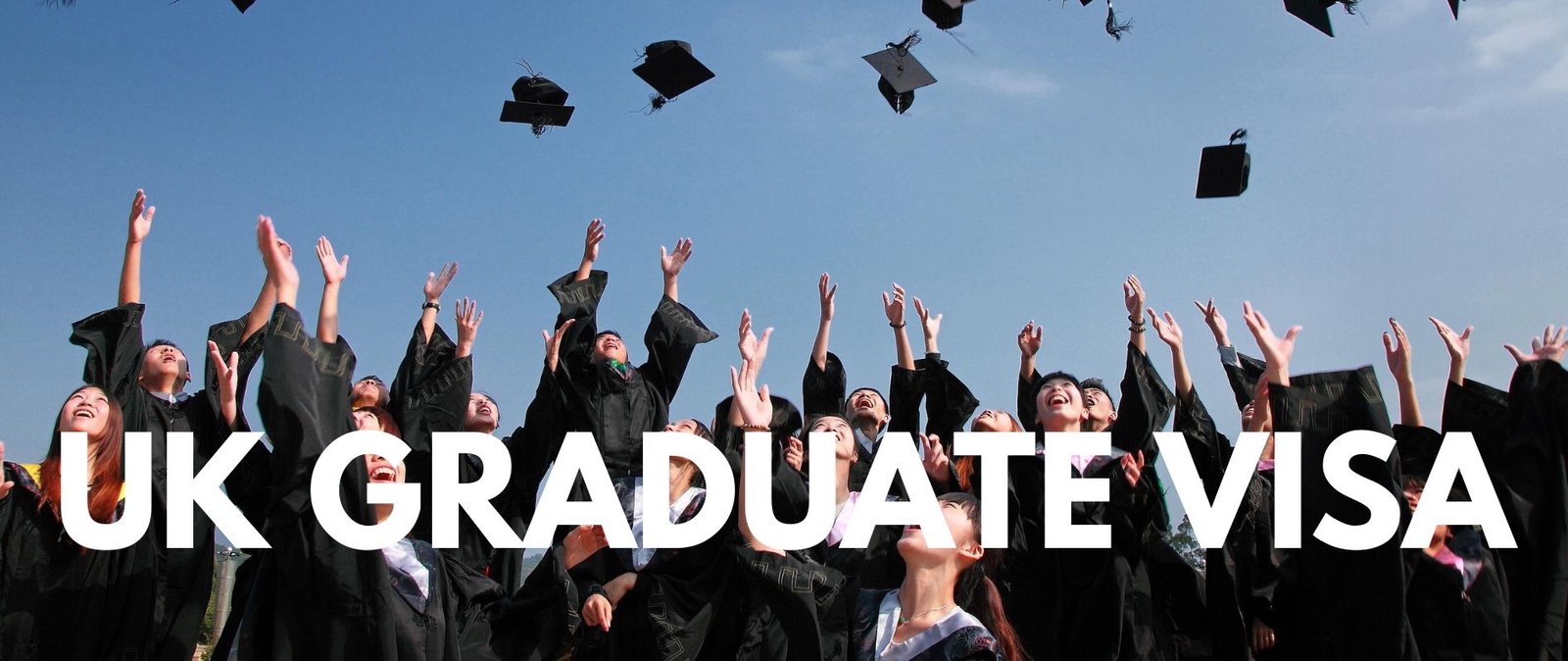In 2025, the UK’s Graduate Visa stands tall as a game-changer for international students, offering a golden opportunity to work or seek jobs for 2–3 years after graduation without needing a job offer or sponsor. With 459,000 study visas issued in 2024 and a 13% rise in applications in January 2025 (Home Office, ICEF Monitor, 2025), the UK’s appeal is undeniable. But how does its Graduate Visa stack up against post-study work options in other top study destinations like the USA, Canada, Australia, and Germany? This in-depth guide, backed by 2025 data from GOV.UK, Universities UK, and global education reports, explores why the UK’s Graduate Visa outshines competitors, critiques their weaker systems, and shows why it’s a must-consider for the 679,970 international students studying in the UK (HESA, 2025). Ready to plan your future? Let’s dive into why the UK’s post-study work route is your best bet in 2025.
What Is the UK Graduate Visa?

The Graduate Visa, launched in July 2021, lets international students who complete a bachelor’s, master’s, or PhD at a Home Office-approved UK university stay in the UK to work or job-hunt for 2 years (3 years for PhD graduates) without sponsorship, minimum salary requirements, or quotas (GOV.UK, 2025). Key features include:
-
Eligibility: Open to all international graduates from approved institutions, with no cap on numbers. In 2024, 139,175 students used it (Home Office, 2025).
-
Cost: £880 application fee (from April 9, 2025) plus £1,035/year Immigration Health Surcharge (IHS) (£2,070 for 2 years, £3,105 for PhDs) (University of Strathclyde, 2025).
-
Flexibility: Work in any sector, at any level—full-time, part-time, freelance, or even start a business. No need for a pre-secured job.
-
Application: Apply within the UK after degree completion, using the UK Immigration: ID Check app or UKVCAS centres. Decisions take ~8 weeks (University of Hertfordshire, 2025).
-
Dependents: PhD students or government-sponsored graduates can bring family; others cannot (TimesTravel, 2025).
Why does it matter? The Graduate Visa fuels the UK’s £60 billion economic boost from international students, supporting jobs and innovation (Universities UK, 2025). For students, it’s a low-risk bridge to UK careers, with 46% of Indian graduates landing tech or finance roles in London (Home Office, 2025).
Why the UK Graduate Visa Shines in 2025
The UK’s Graduate Visa isn’t just a perk—it’s a strategic edge. Here’s why it’s a standout for 2025:
-
Unmatched Flexibility: Unlike many countries, the UK imposes no job type, salary, or sponsorship restrictions. Graduates can explore diverse roles—think software engineering (£50,000/year), marketing (£30,000), or startups—without visa hurdles (Prospects, 2025).
-
No Job Offer Needed: Apply post-graduation without a contract, unlike the USA’s OPT or Australia’s Temporary Graduate Visa, which often demand quicker job commitments (Study Abroad Careers360, 2025).
-
Long Duration: 2 years (3 for PhDs) gives ample time to build skills and networks. Canada’s PGWP offers up to 3 years but is less flexible for non-skilled roles (Financial Express, 2025).
-
Economic Impact: Graduates contribute £651 million to cities like Coventry alone, making the visa a win for students and the UK (BBC, 2025).
-
Global Competitiveness: Despite a 31% drop in study visas (600,024 in 2023 to 415,103 in 2024), the Graduate Visa’s retention signals the UK’s commitment to talent, unlike Canada’s 2024 caps or Australia’s stricter rules (ApplyBoard, 2025).
Student Story: Mohammed Abdullah Sayyed, a 21-year-old Indian student at Coventry University, chose the UK for its Graduate Visa, citing its “opportunities” despite visa cost concerns (£3,000 total) (BBC, 2025).
Comparing the UK Graduate Visa to Other Study Destinations
How does the UK’s Graduate Visa fare against post-study work options in the USA, Canada, Australia, and Germany? Below, we break down each country’s system, highlight their strengths, and expose why they often fall short compared to the UK, using 2025 data for accuracy.
1. USA: Optional Practical Training (OPT)
-
Overview: Allows 12 months of work post-graduation (36 months for STEM graduates) in a field related to your degree. Requires employer sponsorship via E-Verify (mba.com, 2025).
-
Strengths: Strong STEM extension; access to 1.3 million Indian students’ top destination (Study Abroad Careers360, 2025).
-
Weaknesses:
-
Short Duration: Non-STEM students get only 1 year, vs. the UK’s 2–3 years.
-
Job Restrictions: Must align with your major, limiting flexibility (e.g., a psychology grad can’t pivot to marketing).
-
Sponsorship Hassle: Employers must use E-Verify, deterring smaller firms.
-
Uncertainty: 38% drop in Indian student visas in 2025 due to Trump’s policies; H-1B transitions are competitive (6:1 ratio) (Study Abroad Careers360, 2025).
-
-
Why the UK Wins: Longer duration, no job-type limits, and no pre-job requirement make the UK’s Graduate Visa far more accessible and versatile.
2. Canada: Post-Graduation Work Permit (PGWP)
-
Overview: Offers 1–3 years of work (length matches program duration) for graduates from Designated Learning Institutions. No job offer needed (Financial Express, 2025).
-
Strengths: Up to 3 years for longer programs; 35% of 1.3 million Indian students choose Canada (Study Abroad Careers360, 2025).
-
Weaknesses:
-
Policy Volatility: 2024 caps cut permits by 35%; Student Direct Stream ended, dropping approval rates by ~10% in 2025 (Study Abroad Careers360, 2025).
-
Job Market Limits: PGWP holders often face low-skill job traps (e.g., retail) due to strict pathways to permanent residency (£44,000+ salary needed) (iasservices.org.uk, 2025).
-
Dependents: No dependent visas for most students, like the UK’s master’s/undergrad restrictions (Financial Express, 2025).
-
-
Why the UK Wins: The UK’s Graduate Visa offers consistent 2–3 years regardless of program length, with broader job flexibility and no looming caps, unlike Canada’s restrictive 2025 policies.
3. Australia: Temporary Graduate Visa (Subclass 485)
-
Overview: Allows 2–4 years of work post-graduation, depending on degree level (bachelor’s: 2 years, PhD: 4 years). Requires Confirmation of Enrolment (Study Abroad Careers360, 2025).
-
Strengths: High visa success rate for Indians; longer PhD duration (4 years) than the UK’s 3 (Study Abroad Careers360, 2025).
-
Weaknesses:
-
High Costs: AU$29,710 savings proof (2024, ~£15,000) plus AU$1,730 visa fee (~£900) exceed the UK’s £2,950 total (Financial Express, 2025).
-
Stricter Rules: 2025 mandates Coe for onshore applications; “ghost college” crackdowns raise scrutiny (Study Abroad Careers360, 2025).
-
Job Pressure: Skilled Worker Visa requires £38,700+ salary, pushing graduates into high-skill roles fast (iasservices.org.uk, 2025).
-
-
Why UK Wins: Lower costs (£2,950 vs. £15,900), no savings proof for most, and no rush to secure high-salary jobs make the UK’s visa more student-friendly.
4. Germany: Job-Seeker Visa
-
Overview: Grants 18 months post-graduation to find jobs in your field, transitioning to an EU Blue Card or work visa if employed (Financial Express, 2025).
-
Strengths: High visa approval rate; part-time work during studies (Study Abroad Careers360, 2025).
-
Weaknesses:
-
Short Duration: 18 months vs. the UK’s 2–3 years; job must match degree, limiting pivots (e.g., no tech roles for history grads).
-
Language Barrier: Many jobs require German (B1–C1), despite English-taught programs, frustrating 20% of non-EU graduates (FindAPhD, 2025).
-
Financial Proof: €11,208/year (~£9,300) savings needed, vs. the UK’s none for most (TimesTravel, 2025).
-
-
Why UK Wins: Longer duration, no job-type or language restrictions, and minimal financial proof make the UK’s Graduate Visa more accessible.
Key Takeaway: The UK’s Graduate Visa offers unmatched duration, flexibility, and ease compared to the USA’s restrictive OPT, Canada’s capped PGWP, Australia’s costly Subclass 485, and Germany’s language-heavy Job-Seeker Visa. Its no-sponsorship, no-job-offer model empowers students to explore careers freely, making it a top choice in 2025.
Challenges and How to Navigate Them
While the Graduate Visa is a gem, it’s not without hurdles. Here’s how to tackle them:
-
Cost: £2,950 total (£880 fee + £2,070 IHS for 2 years) can strain budgets, especially vs. China’s £5,000–£6,000 return incentives (BBC, 2025). Tip: Save £300/month during studies; use Student Beans for discounts (10–20% off essentials).
-
Job Market: London’s tech (6:1 applicant ratio) and healthcare (5:1) are competitive (Indeed, 2025). Tip: Target growing sectors like AI (10,000+ jobs, Cambridge) or NHS roles (15,000, Manchester) (Tech Nation, 2025).
-
Visa Restrictions: No dependents for master’s/undergrad students; apply before student visa expires (GOV.UK, 2025). Tip: Check eligibility via UKCISA; apply early to avoid gaps (UKCISA, 2025).
-
Uncertainty: Rumours of Graduate Visa changes persist, though retained in 2025 (Ward Hadaway, 2025). Tip: Monitor GOV.UK for White Paper updates (expected June 2025).
Student Insight: A Coventry alumna noted the £3,000 visa cost was daunting but worth it for UK job prospects, unlike China’s return incentives (BBC, 2025).
Why Choose the UK in 2025?
The Graduate Visa isn’t just a visa—it’s a launchpad. Here’s why it makes the UK a top study destination:
-
Job Opportunities: 1.2 million vacancies in 2025, with 350,000 in London (tech, finance) and 120,000 in Manchester (healthcare, tech) (ONS, 2025). Starting salaries: £30,000–£60,000 (Prospects, 2025).
-
Global Hub: 44 of the world’s top 200 universities (QS, 2025); 27% rise in 2025 applications (ICEF Monitor, 2025).
-
Cultural Fit: 116,455 Indian and 108,582 Chinese students thrive in diverse cities like Coventry (16,285 non-UK students) (HESA, 2025).
-
Soft Power: Graduates boost the UK’s £60 billion education economy, enhancing your CV’s global value (Universities UK, 2025).
X Sentiment: Posts on X in 2025 praise the Graduate Visa as a “game changer” for career starters, though some note its cost vs. home-country incentives (e.g., China’s £5,000 return bonus) (X posts, 2025).
How to Make the Most of the Graduate Visa
-
Plan Early: Apply for post-degree confirmation, but before your student visa expires. Use the ID Check app for a smoother process (University of Hertfordshire, 2025).
-
Network: Join uni career fairs (e.g., UCL’s Tech Week) or LinkedIn groups for UK tech/healthcare roles (10,000+ monthly openings) (Tech Nation, 2025).
-
Explore Cities: Target high-demand hubs like London (£45,000 average salary) or Birmingham (£33,000, affordable living) (ONS, 2025).
-
Upskill: Take short courses in AI, cybersecurity, or NHS-related fields via FutureLearn (£200–£500) to boost employability (Prospects, 2025).
-
Stay Updated: Follow GOV.UK and UKCISA for visa policy shifts, especially post-June 2025 White Paper (Ward Hadaway, 2025).
The Bigger Picture: Why the UK Leads in 2025
While Canada tightens caps, Australia hikes costs, the USA restricts visas, and Germany demands language skills, the UK’s Graduate Visa remains a beacon of opportunity. Its 2–3 years of unrestricted work access, backed by a £2.8 trillion economy and 1.2 million jobs, empowers students to build careers without the red tape choking other destinations (IMF, ONS, 2025). Despite a 31% visa drop in 2024, January 2025’s 13% application surge signals renewed confidence, especially from India (25% of students) and China (20%) (ICEF Monitor, 2025). The Graduate Visa’s retention, despite migration debates, cements the UK’s edge (ApplyBoard, 2025).
Your Next Steps
Dreaming of a UK degree and career? The Graduate Visa is your ticket to turning studies into success. Check UCAS for courses, GOV.UK for visa rules, or Indeed for jobs. From London’s tech towers to Manchester’s NHS hubs, the UK is waiting. Apply for 2025, grab your visa, and make your mark.









